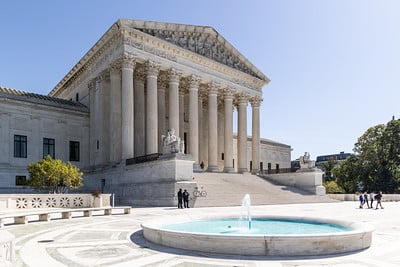Oral Arguments Over Trump’s Tariffs
November 6, 2025

“United States Supreme Court Building, Washington, D.C., United States” by Billy Wilson is licensed under CC BY-NC 2.0
On November 5, 2025, the Supreme Court heard oral argument in Learning Resources, Inc. v. Trump to determine whether the International Emergency Economic Powers Act (IEEPA) permits President Trump to impose sweeping emergency tariffs. Although it is not clear when the Court will rule, there is pressure to reach a decision soon because the longer the tariffs are in effect, the more money the government would have to refund if the tariffs are invalidated by the Court.
In the two-and-a-half-hour argument, a majority of the Court seemed unconvinced that the President had the power to impose emergency tariffs. U.S. Solicitor General D. John Sauer argued that Congress intentionally conferred broad powers on the president to address emergencies when it passed the IEEPA. Framing the case as involving foreign commerce, he also argued that the President had wide latitude under the IEEPA to unilaterally set tariffs to reduce the trade deficit and encourage U.S. manufacturing. But Justices on both sides of the aisle were critical of the claim that the tariffs are a form of “regulation” on imports rather than a tax—which Justice Sotomayor pointed out is paid for by American citizens. Justice Barrett questioned the scope of what she described as President Trump’s “across the board” reciprocal tariffs. Chief Justice Roberts suggested that the major questions doctrine applies—a doctrine that the Court repeatedly relied on to invalidate President Biden’s initiatives. Justices Gorsuch and Barrett also suggested the administration’s position could represent an unconstitutional delegation of legislative power that would be difficult for Congress to reclaim. As Justice Gorsuch warned, siding with the administration could result in a “one-way ratchet . . . of power . . . away from the people’s elected representatives.”
Neal Katyal, representing the parties challenging the tariffs, began his argument by saying: “Tariffs are taxes.” He argued that the verb ‘regulate’ cannot credibly mean ‘impose taxes,’ noting that although Congress has used the word ‘regulate’ 1,500 times in legislation, it has never been used to mean imposing taxes or raising revenue. Justice Brett Kavanaugh stated that President Nixon (relying on a different statute) had once used emergency powers to impose temporary 10 percent tariffs, which may open the door for Trump’s current tariffs. But Justice Kavanaugh also signaled that he had not made up his mind about the case. On one hand, he is trying to figure out whether Congress intended to grant tariff power in IEEPA when it gave the president power to “regulate importation.” On the other hand, Justice Kavanaugh expressed concerns about taking away tariffs from the president’s “suite of tools” to deal with economic emergencies. Justice Barrett raised what appeared to be a major issue for the Court: reimbursement if the tariffs were deemed unlawful. Katyal acknowledged the difficulty, but suggested the Court had options at its disposal and that the “mess” it may create should not be a reason to side with the administration.
The aggressive questioning during oral arguments yesterday suggests (as many predict) that the Administration may lose this case. However, the scope and basis for such a decision remain open. And, of course, we cannot know for sure how the Court will rule until it issues an opinion. Until then, it is all speculation.